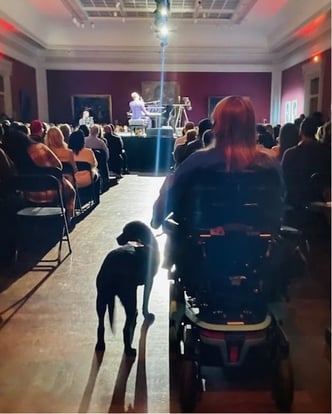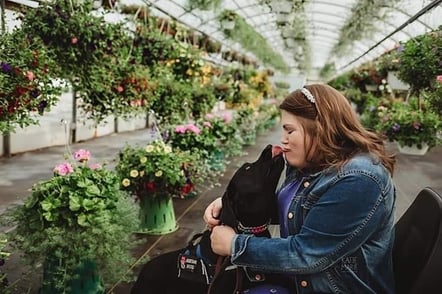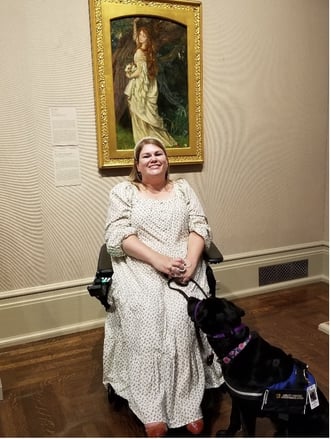Katie Shelley talks art, access, and being the first-ever Manager for Access Initiatives at a major art museum.
“Everyone should have the opportunity to experience art, I don’t want anybody who wants to visit the museum to feel as though they will not be able to because the museum is not accessible to them,” says Katie Shelley, a Detroit native and self-professed bookworm, who is the new Manager for Access Initiatives at the Toledo Museum of Art. “My hope is that through the changes I will implement, the Disability Community in the Toledo area and beyond will see the museum as a place where they feel safe and comfortable, and know that they can always come here as a place of refuge and recreation. We are not there yet, and this is not going to happen overnight, but I’m encouraged by the progress that we have made so far in just the six months that I have been in the position.”
Katie’s passion for creating a welcoming space for the Disability Community in the Toledo Museum of Art comes from her background as an advocate and an art aficionado. Growing up, Katie has always loved all things art. From movies and musicals to museums and books – she wanted to take it all in. In fact, Katie received her master’s in Library and Information Science. “Before I found my current career path, I wanted to be a librarian,” she shared with enthusiasm, “free books, movies, music, and other media for everyone!”
However, after receiving her master’s degree, the most frustrating barrier Katie encountered as a disabled woman in the working world was being judged for her disability while going through the interview process.
“For over two years, I went on multiple interviews, and my ability to physically handle the work was questioned multiple times. It was discouraging and ruined my confidence in my ability to do the work,” Katie explained candidly. “I don’t know that this was the best way to address blatant discrimination, but I gave up on the library world and decided to switch paths – using the frustration over these barriers and my lived disability experience to my advantage – and pursued a master’s degree focusing on Disability Studies so that I could advocate for the rights of people with disabilities.”
 After switching career paths, Katie became a Disability Rights advocate with The Ability Center of Greater Toledo, working on access issues and she was appointed Co-Chair of the Ohio Olmstead Task Force. The Task Force is a statewide grassroots coalition of Ohioans of all ages with and without disabilities who advocate for the rights of people with disabilities to live, work, and participate in their communities. The Task Force advocates for accessible housing, transportation, and healthcare, as all these issues impact a person’s ability to live independently in the community.
After switching career paths, Katie became a Disability Rights advocate with The Ability Center of Greater Toledo, working on access issues and she was appointed Co-Chair of the Ohio Olmstead Task Force. The Task Force is a statewide grassroots coalition of Ohioans of all ages with and without disabilities who advocate for the rights of people with disabilities to live, work, and participate in their communities. The Task Force advocates for accessible housing, transportation, and healthcare, as all these issues impact a person’s ability to live independently in the community.
“My advocacy work with the Ohio Olmstead Task Force is important to me because I want to ensure Ohioans with disabilities are able to actualize their right to live independently and not be excluded or segregated from their communities,” Katie shared.
While Katie still serves as co-chair of the Olmstead Task Force, she recently left her position at The Ability Center to take on the inaugural role of Manager for Access Initiatives at the Toledo Museum of Art. The position was created in 2021 as a result of a collaborative effort between The Ability Center and the museum. The Toledo Museum of Art wanted to take The Ability Center’s vision of making Toledo the most disability-friendly community in the country and align it with their own vision of becoming a model museum with a commitment to quality and a culture of belonging, and in creating the Manager of Access Initiatives position, become the most accessible arts institution in the United States.
“It means a great deal to me that the museum wants to create a more accessible and inclusive environment for their visitors and staff, and I feel honored that I was chosen to help make the museum’s dream of being the most accessible arts institution in the United States a reality,” Katie beamed. “My vision for this position is that, through my work, I will ensure that the museum becomes an institution where accessibility is incorporated into everything we do and offer, and anyone can come through our doors and feel that they are welcome, they belong, and we want them to be here and interact with our collection and our programs.”
For Katie, ensuring that the Toledo Museum of Art is a place where the Disability Community feels welcome goes beyond making access improvements. She emphasized that art is a form of activism that helps to break down barriers and lead to progressive and radical change.
“Disability rights are civil rights, and civil rights and art are irrevocably connected. Art can, and has, been used as a form of protest to evoke change,” Katie passionately explained. “This is one of many reasons why art resonates with so many people, and this makes it all the more important that the Toledo Museum of Art is striving to be more inclusive so that not only can people experience art that resonates with them, but also be inspired and encouraged to create art that speaks to their lived experience.”
While Katie is trailblazing in the world of art and accessibility now, it took a long time for her to have confidence in herself and to think of herself as a leader. Katie did not have any peers or mentors with disabilities growing up, so she felt her disability was something she needed to overcome rather than something to embrace.
 “It wasn’t until I was in college and started to meet other students with disabilities who had interests, dreams, and goals similar to my own that I came to be more comfortable with my identity as a disabled woman, and that helped me to realize that my disability is not something to be ashamed of, but rather it’s an integral part of who I am and has shaped me as a person,” Katie expressed. “I am glad that I eventually came to that realization, but if I had had more disabled women mentors growing up, I might have had more confidence in myself and my disabled identity much sooner.”
“It wasn’t until I was in college and started to meet other students with disabilities who had interests, dreams, and goals similar to my own that I came to be more comfortable with my identity as a disabled woman, and that helped me to realize that my disability is not something to be ashamed of, but rather it’s an integral part of who I am and has shaped me as a person,” Katie expressed. “I am glad that I eventually came to that realization, but if I had had more disabled women mentors growing up, I might have had more confidence in myself and my disabled identity much sooner.”


 After switching career paths, Katie became a Disability Rights advocate with The Ability Center of Greater Toledo, working on access issues and she was appointed Co-Chair of the Ohio Olmstead Task Force. The Task Force is a statewide grassroots coalition of Ohioans of all ages with and without disabilities who advocate for the rights of people with disabilities to live, work, and participate in their communities. The Task Force advocates for accessible housing, transportation, and healthcare, as all these issues impact a person’s ability to live independently in the community.
After switching career paths, Katie became a Disability Rights advocate with The Ability Center of Greater Toledo, working on access issues and she was appointed Co-Chair of the Ohio Olmstead Task Force. The Task Force is a statewide grassroots coalition of Ohioans of all ages with and without disabilities who advocate for the rights of people with disabilities to live, work, and participate in their communities. The Task Force advocates for accessible housing, transportation, and healthcare, as all these issues impact a person’s ability to live independently in the community. “It wasn’t until I was in college and started to meet other students with disabilities who had interests, dreams, and goals similar to my own that I came to be more comfortable with my identity as a disabled woman, and that helped me to realize that my disability is not something to be ashamed of, but rather it’s an integral part of who I am and has shaped me as a person,” Katie expressed. “I am glad that I eventually came to that realization, but if I had had more disabled women mentors growing up, I might have had more confidence in myself and my disabled identity much sooner.”
“It wasn’t until I was in college and started to meet other students with disabilities who had interests, dreams, and goals similar to my own that I came to be more comfortable with my identity as a disabled woman, and that helped me to realize that my disability is not something to be ashamed of, but rather it’s an integral part of who I am and has shaped me as a person,” Katie expressed. “I am glad that I eventually came to that realization, but if I had had more disabled women mentors growing up, I might have had more confidence in myself and my disabled identity much sooner.”